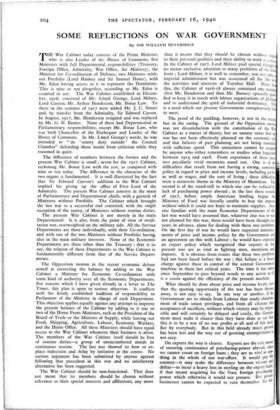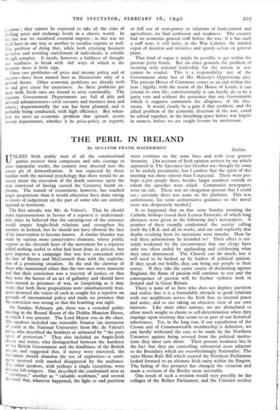SOME REFLECTIONS ON WAR GOVERNMENT
By SIR WILLIAM BEVERIDGE
THE War Cabinet today consists of the Prime Minister, who is also Leader of dr: House of Commons, five Ministers with full Departmental responsibilities (Treasury, Foreign Office, Admiralty, War Office, Air Ministry), the Minister for Co-ordination of Defence, two Ministers with- out Portfolio (Lord Hanky and Sir Samuel Hoare), with Mr. Eden having access to it to represent the Dominions. This is nine or ten altogether, according as Mr. Eden is counted or not. The War Cabinet established in Decem- ber, 1916, consisted of Mr. Lloyd George, Lord Milner, Lord Curzon, Mr. Arthur Henderson, Mr. Bonar Law. To these in the summer of 1917 were added Mr. J. C. Smuts and, by transfer from the Admiralty, Sir Edward Carson. In August, 1917, Mr. Henderson resigned and was replaced by Mr. G. N. Barnes. None of these had Departmental or Parliamentary responsibilities, except Mr. Bonar Law, who was both Chancellor of the Exchequer and Leader of the House of Commons. In Mr. Lloyd George's words, he was intended to " do ' sentry duty outside' the Council Chamber" defending those inside from criticism while they reasoned in quiet.
The difference of numbers between the former and the present War Cabinet is small ; seven for the 1917 Cabinet, reckoning Mr. Bonar Law with the rest, as compared with nine or ten today. The difference in the character of the two organs is fundamental. It is well illustrated by the fact that Sir Edward Carson's addition to the War Cabinet implied his giving up the office of First Lord of the Admiralty. The present War Cabinet consists in the main of Parliamentary and Departmental chiefs, with a garnish of Ministers without Portfolio. The Cabinet which brought the last war to a successful end consisted, with the single exception of the sentry, of Ministers without routine duties.
The present War Cabinet is not merely in the main Departmental. It is also, from the point of view of totali- tarian war, overweighted on the military side. All the Service Departments are there individually, with their Co-ordinator, and with one of the two Ministers without Portfolio having also in the main military interests. None of the Economic Departments are there other than the Treasury ; that is to say, the relation of these Departments to the War Cabinet is fundamentally different from that of the Service Depart- ments.
The Opposition motion in the recent economic debate aimed at correcting the balance by adding to the War Cabinet a Minister for Economic Co-ordination with some kind of authority over all the Economic Departments. For reasons which I have given already in a letter to The Times, this plan is open to serious objection. It conflicts with the firmly established tradition of responsibility to Parliament of the Minister in charge of each Department. This objection applies equally against any attempt to improve the present balance of the Cabinet by adding to it one or two of the Home Front Ministers, such as the President of the Board of Trade or the Minister of Supply, while leaving out Food, Shipping, Agriculture, Labour, Economic Warfare, and the Home Office. All these Ministers should have equal access to the War Cabinet whenever their business is afoot. The members of the War Cabinet itself should be free of routine duties—a group of unencumbered minds in continuous session. The last war showed us how to re- place indecision and delay by initiative at the centre. No serious argument has been submitted by anyone against following that precedent in this war and no satisfactory alternative has been suggested.
The War Cabinet should be non-functional. That does not mean that its members should be chosen without reference to their special interests and affiliations, any more than it means that they should be chosen without regar to their personal qualities and their ability to work as a t In the Cabinet of 1917, Lord Milner paid special though no means exclusive, attention to many problems of the ho front ; Lord Milner, it is well to remember, was not only imperial administrator but was associated all his life ni the activities and interests of Toynbee Hall. More this, the Cabinet of 1916-18 always contained one mein (first Mr. Henderson and then Mr. Barnes) specially quail fled to keep it in touch with labour organisations of all kin and to understand the spirit of industrial democracy. is a need which our present Government conspicuously f to meet.
The proof of the pudding, however, is not in the recipe but in the eating. The ground of the Opposition mono was not dissatisfaction with the constitution of the Iv Cabinet as a matter of theory, but an uneasy sense that war has not been effectively planned on the economic sid and that failures of past planning are not being remedi with sufficient speed. This uneasiness cannot be esca by anyone who either remembers or studies what happen between 1914 and 1918. From experience of those years two peculiarly vivid memories stand out. One is of the difficulties that result from not having a strong, consistent policy in regard to price and income levels, including profits as well as wages, and the cost of living ; these difficulties were a recurrent theme in the Ministry of Munitions. The second is of the stand-still to which one can be reduced by lack of purchasing power abroad ; in the last three months of 1917, before ample American lending began, the Ministry of Food was literally unable to buy the imports without which it could not hope to maintain supplies. Any- one familiar with the main Economic Departments of the last war would have assumed that, whatever else was or was not planned for this war, there would have been thought out, years in advance, plans for dealing with these two problems. On the first day of war he would have expected announce- ments of price and income policy by the Government and an agreement on this with Labour ; he would have expected an export policy which recognised that exports in this present war are as vital as fighting men, munitions and imports. It is obvious from events that these two problems had not been faced before the war ; this failure is a heavy charge against those in control of the central Government machine in these last critical years. The time it has taken since September to pass beyond words to any action at all is a count against the efficiency of the present machine.
What should be done about price and income levels, nosy that the opening opportunity of the war has been thrown i away, is not easy to say. In one way or another, if the Government are to obtain from Labour that ready abandon- ment of trade union privileges, and from all citizens that acceptance of sacrifices, without which victory may be impos- sible and will certainly be delayed and 'costly, the Govern- ment must make it clearer than they have done as yet that this is to be a war of no war profits at all and of fair ger!' fice by everybody. But in this field already much ground has been lost and the way out of growing entanglements Is not easy.
On exports the way is clearer. Exports are the sole means of ensuring continuance of purchasing-power abroad, since we cannot count on foreign loans ; they are as vital as or thing in the whole of our war-effort. It would pay the country—it may make the difference between victory and defeat—to incur a heavy loss in sterling on the export trade' if that meant acquiring for the State foreign purchasing power which otherwise it would not possess. But private businesses cannot be expected to ruin themselves for this purpose • they cannot be expected to take all the risks of Ur 3 shifting price and exchange levels in a chaotic world. In the last war we socialised essential imports ; in this war we shall have in one way or another to socialise exports as well. The problem of doing that, while both retaining business initiative and avoiding enrichment of individuals, is soluble though complex. It needs, however, a boldness of thought and readiness to break with old ways of which at the moment there is little sign.
These two problems—of price and income policy and of exports—have been named here as illustrations only of a general theme. Other economic problems are already with us and give cause for uneasiness. As these problems get dealt with, fresh ones are bound to arise continually. The separate Government Departments are full of able and devoted administrators—civil servants and business men and others ; departmentally the war has been planned, and is probably being conducted, with high efficiency. But when- ever we meet an economic problem that spreads across several departments, whether it be price-policy or exports, or full use of man-power or relations of food-control and agriculture, we find confusion and weakness. The country had no economic general staff before the war; if it has such a staff now, it still lacks, in the War Cabinet, the needed organ of decision and initiative and speedy action on general plans.
That kind of organ it might be possible to get within the present party frame. But on other grounds the problem of securing truly national leadership for the nation at war cannot be evaded. This is a responsibility not of the Government alone but of His Majesty's Oppositions also. The present House of Commons comes to an end within this year ; legally, with the assent of the House of Lords, it can extend its own life; constitutionally it can hardly do so by a party vote and without the assurance that any Government which it supports commands the allegiance of the elec- torate. It would clearly be a gain if that problem, and the allied problem of the economic direction of the war, could be solved together, in the breathing-space before war begins in earnest, before we are taught lessons by misfortune.







































 Previous page
Previous page